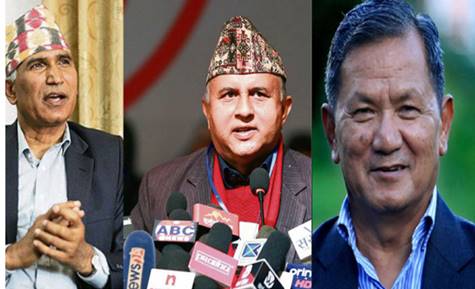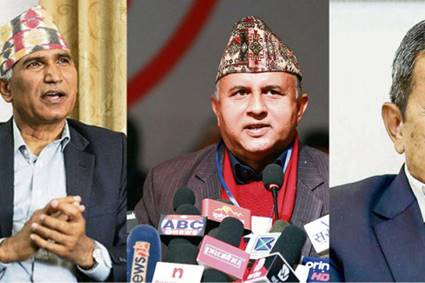尼泊尔《共和国报》网站
https://myrepublica.nagariknetwork.com/news/chair-olis-three-pillars-in-uml-36-15.html
作者:塔彭德拉·卡尔基(Tapendra Karki)
2025年7月19日

图为被视为奥利主席在尼共(联合马列)党内三根支柱的领导人,自左至右:副主席比什努·普拉萨德·鲍德尔(Bishnu Prasad Paudel)、总书记香卡·博克瑞尔(Shankar Pokharel)和副总书记普里特维·苏巴·古隆(Prithvi Subba Gurung)
尼共(联合马列)资深副主席伊什瓦尔·博克瑞尔谈到了前总统比迪亚·德维·班达里重返党内政治以及党章大会相关事宜。他甚至直接质问党主席奥利:“你为什么还想继续领导?”奥利宣布他准备再任一届党主席,两人爆发激烈交锋。伊什瓦尔·博克瑞尔发言时,奥利问道:“是谁在策划把我赶下台?”
加德满都7月19日讯:在周四(7月17日)举行的中央书记处会议上,尼共(联合马列)(CPN-UML)主席奥利(KP Sharma Oli)显得异常严肃。他阴郁的神情是在资深副主席(Senior Vice-Chair)伊什瓦尔·博克瑞尔(Ishwar Pokhrel)明显偏离奥利路线之后出现的。会议照片显示,所有与会者都处于明显紧张的氛围中。
会议开始时,尼泊尔总理、尼共(联合马列)主席奥利就前总统比迪亚·德维·班达里(Bidya Devi Bhandari)有意重返政坛表达了看法。谈及班达里时,奥利说:“她已经更新了党籍。她多次发表公开声明。这是否是我们在党的书记处会议上可以讨论或不可以讨论的事情?应该允许她重返政坛还是不应该?”
他的发言之后是依次进行的讨论。班达里已于6月28日宣布重返活跃的党内政治活动。尼共(联合马列)书记处正式讨论了此事,此事在周五的政治局会议上也曾被提出。
在尼共(联合马列)内部,关于班达里回归出现了两种截然不同的观点。6月28日,资深副主席伊什瓦尔·博克瑞尔公开表示,班达里重返政坛不应被视为异常。奥利主席对此心知肚明。在伊什瓦尔·博克瑞尔表态支持班达里之后,奥利获得了副主席比什努·普拉萨德·鲍德尔(Bishnu Prasad Paudel)和副总书记普里特维·苏巴·古隆(Prithvi Subba Gurung)的支持,这两人都是党内颇具影响力的人物。
由于总书记香卡·博克瑞尔(Shankar Pokharel)一直站在奥利一边,因此该方面并未造成太大困难。将比什努·普拉萨德·鲍德尔和普里特维·苏巴·古隆留在自己阵营中,对奥利来说既是必要也是无奈之举。
在书记处会议上,奥利必须将比什努·普拉萨德·鲍德尔和普里特维·苏巴·古隆作为可信赖的盟友推出来,以巩固自己在党内的地位。
7月11日,尼共(联合马列)领导人基姆拉尔·巴特拉伊(Khimlal Bhattarai)分享了一张奥利和比什努·普拉萨德·鲍德尔的照片,配文称他们是“胸怀宽广、致力于为国家做些事情的成功且有能力的人”,这进一步证实了这种结盟关系。该贴文表明比什努·普拉萨德·鲍德尔属于奥利阵营。
不久之后,卡格·拉吉·阿迪卡里(Khag Raj Adhikari)分享了一张与普里特维·苏巴·古隆的合照。尽管他们在党内持有不同观点,但领导人之间进行此类会晤和表达善意在尼共(联合马列)圈内并不罕见。他们的会面被视为意味深长。7月16日,卡格·拉吉·阿迪卡里在分享与普里特维·苏巴·古隆的合影时写道:“我们有幸就甘达基省(Gandaki Province)的繁荣进行了深入讨论。我们拥有共同的愿景。我们得出结论,联邦议会和政府必须在法律改革和资源调动方面做出认真而建设性的努力,以加强该省。”
7月17日,书记处召开会议讨论即将举行的党章大会(Statute Convention),会议决定禁止前总统比迪亚·德维·班达里作为代表参加。理由是只有来自党第十次全国代表大会(10th General Convention)的代表才能参加党章大会,因此她被阻止参加。会议持续了10个小时,并通过了提案,规定只有第十次全国代表大会的代表才能担任党章大会(Statute Convention)代表。在第十次全国代表大会召开时,比迪亚·德维·班达里正担任尼泊尔总统。按照尼泊尔宪法规定出任总统必须辞去党内职务并退出所属政党。
会议期间,副主席比什努·普拉萨德·鲍德尔提议取消党章中对党内领导职务70岁的年龄限制和两届任期上限。尽管他也提议将党的干部(office-bearers)人数从19人减少到11人,并将中央委员会成员缩减至199人,但最终达成共识,设15名干部和251名中央委员会成员。
包括奥利主席在内的所有成员都在书记处会议上表达了意见。资深副主席伊什瓦尔·博克瑞尔发言时间最长——约两个半小时——而奥利则在一旁倾听,偶尔喝水。伊什瓦尔·博克瑞尔谈到了比迪亚·德维·班达里重返党内政治以及党章大会相关事宜。他甚至直接质问奥利:“你为什么还想继续领导?” 奥利宣布他准备再任一届党主席,两人爆发激烈交锋。伊什瓦尔·博克瑞尔发言时,奥利问道:“是谁在策划把我赶下台?”
随后,副主席阿斯塔拉什米·沙克亚(Astalaxmi Shakya)表示,对领导权感兴趣的人应在即将到来的全国代表大会中竞争,并建议进行更广泛的讨论和领导层发展,这为讨论增添了活力。会上辩论了各种与党章相关的规定。该问题在政治局会议上也得到了优先讨论。由于在取消年龄和任期限制的提案上存在分歧,会议拖延了很久。据一位干部称,由于缺乏共识,最终根据多数票做出了决定。
当伊什瓦尔·博克瑞尔提出设定70岁年龄限制的问题时,奥利厉声问道:“这是谁的议程——卡尔纳·塔帕(Karna Thapa)的吗?”这激怒了伊什瓦尔·博克瑞尔,导致激烈争执。“奥利主席说伊什瓦尔·博克瑞尔的提案是卡尔纳·塔帕的,不适合在书记处讨论,这引发了长时间的口头冲突,”一位干部说。“争论持续了很长时间,随后陷入了一种沉默。”
消息人士称,伊什瓦尔·博克瑞尔在党章讨论期间表示反对,指出党章已被印刷了三次。当他提出这个问题时,奥利试图干预,这引起了伊什瓦尔·博克瑞尔的强烈反应。“我正在表达我的观点。是你自己心里有问题。党的领导人不应这样行事,”据报道伊什瓦尔·博克瑞尔如是说。
比迪亚·德维·班达里被视为第十一次全国代表大会(11th General Convention)上党主席的可能竞争者。据报道,伊什瓦尔·博克瑞尔正在推进计划,不惜一切代价确保比迪亚·德维·班达里成为下一任党主席。
奥利在会议中的领悟

图为尼共(联合马列)书记处会议。自左至右依次为:副主席阿斯塔拉什米·沙克亚(Astalaxmi Shakya),资深副主席伊什瓦尔·博克瑞尔(Ishwar Pokhrel),主席奥利(KP Sharma Oli),总书记香卡·博克瑞尔(Shankar Pokharel),助理总书记普拉迪普·贾瓦利(Pradip Gyawali)。
在周四的书记处会议上,奥利主席坐在总书记香卡·博克瑞尔和资深副主席伊什瓦尔·博克瑞尔之间,香卡在他右边,伊什瓦尔在他左边。当奥利得到一位博克瑞尔支持时,另一位博克瑞尔却在反对他。
尽管提案是以多数票和少数票通过的,但并未正式记录任何反对意见。这是自第十次全国代表大会以来首次出现提案根据多数与少数之分获得通过的情况。一位干部说,“奥利主席真正体会到了什么叫开会——有人支持,有人反对。这是他第一次直面公开的异议。”。
伊什瓦尔站在哪里,哪里就成了建制派阵营
在过去的全国代表大会中,伊什瓦尔·博克瑞尔站在哪一边,哪一边就成为建制派阵营(establishment faction)。在2009年2月于布德沃尔(Butwal)举行的第八次全国代表大会(8th General Convention)上,伊什瓦尔·博克瑞尔站在贾拉·纳特·卡纳尔(Jhala Nath Khanal)的阵营一边,并作为该阵营的总书记候选人击败了帕拉迪普·尼帕尔(Pradeep Nepal)。如果他当时没有支持贾拉·纳特·卡纳尔,奥利很可能那时就当上了主席,因为奥利和卡纳尔是争夺最高职位的主要对手。
奥利认识到这一点,在2014年7月举行的第九次全国代表大会(9th General Convention)上,他将伊什瓦尔·博克瑞尔拉入自己的阵营。当时,伊什瓦尔·博克瑞尔是奥利阵营的总书记候选人。在伊什瓦尔·博克瑞尔的支持下,奥利以44票的优势击败马达夫·库马尔·尼帕尔(Madhav Kumar Nepal)赢得党主席职位。伊什瓦尔·博克瑞尔也以微弱优势击败了马达夫·库马尔·尼帕尔阵营的候选人苏伦德拉·潘迪(Surendra Pandey),赢得总书记职位。苏伦德拉·潘迪后来在第十次全国代表大会上当选为副主席。在这两次代表大会中,伊什瓦尔·博克瑞尔支持的阵营都成为了建制派阵营而掌握权力。
原文
Chair Oli's three pillars in UML
https://myrepublica.nagariknetwork.com/news/chair-olis-three-pillars-in-uml-36-15.html
The UML Chair Oli appeared notably serious during Thursday’s Central Secretariat meeting. His somber demeanor followed senior vice-chair Ishwar Pokhrel's apparent divergence from Oli's line.
By Tapendra Karki
July 19, 2025 at 2:45 PM

KATHMANDU, July 19: The CPN-UML Chair KP Sharma Oli appeared notably serious during Thursday’s Central Secretariat meeting. His somber demeanor followed senior vice-chair Ishwar Pokhrel's apparent divergence from Oli's line. Photos from the meeting show a visibly tense atmosphere among all participants.
At the beginning of the meeting, Prime Minister and UML Chair Oli expressed his views regarding former President Bidya Devi Bhandari’s interest in re-entering politics. Speaking about Bhandari, Oli said, “She has already renewed her party membership. She has made several public statements. Is this a matter we can or cannot discuss in the party’s Secretariat meeting? Should she be allowed to return to politics or not?”
His remarks were followed by a turn-wise discussion. Bhandari had announced her return to active party politics on June 28. The UML Secretariat formally discussed this matter, which had also been raised during the Politburo meeting on Friday.
Within the UML, two distinct views have emerged regarding Bhandari’s return. On June 28, senior vice-chair Pokhrel publicly stated that Bhandari’s return to politics should not be seen as unusual. Chair Oli was well aware of this. After Pokhrel took a stance in Bhandari’s favor, Oli secured the backing of Vice-Chair Bishnu Prasad Paudel and Deputy General Secretary Prithvi Subba Gurung, both influential figures in the party.
Since General Secretary Shankar Pokharel has always stood by Oli, there hasn’t been much difficulty from that front. Retaining Vice-Chair Paudel and Gurung under his wing is both a necessity and a compulsion for Oli.
In the Secretariat meeting, Oli had to present Paudel and Gurung as trustworthy allies to strengthen his internal position.
This alignment was further confirmed when UML leader Khimlal Bhattarai shared a photo of Oli and Paudel on July 11, with a caption describing them as “successful and capable men with broad hearts committed to doing something for the country.” The post signaled that Paudel was in Oli’s camp.
Soon after, Khag Raj Adhikari shared a photo with Gurung. Although they hold differing views in the party, such meetings and exchanges of warmth between leaders are not unusual in UML circles. Their meeting was seen as meaningful. On July 16, Adhikari wrote, “We had the chance to have an in-depth discussion on the prosperity of Gandaki Province. We both share the same vision. We concluded that the federal parliament and government must make serious and constructive efforts in terms of legal reform and resource mobilization to strengthen the province,” while sharing the photo with Gurung.
On July 17, the Secretariat meeting convened to discuss the upcoming Statute Convention, barring former President Bhandari from participating as a representative. Citing that only representatives from the party’s 10th General Convention could be part of the Statute Convention, she was prevented from attending. The meeting lasted 10 hours and passed the proposal that only the 10th General Convention representatives would serve as Statute Convention delegates. At the time of the 10th Convention, Bhandari was serving as President of Nepal.
During the meeting, Vice-Chair Paudel proposed removing the age limit of 70 years and the two-term cap from the party statute on executive positions of the party. Although he also proposed reducing the number of party office-bearers from 19 to 11 and trimming the central committee to 199 members, a consensus was reached to have 15 office-bearers and 251 central committee members.
All members, including Chair Oli, expressed their opinions in the Secretariat meeting. Senior Vice-Chair Pokhrel spoke for the longest time—around two and a half hours—while Oli listened, occasionally sipping water. Pokhrel addressed Bhandari’s reentry into party politics and matters concerning the Statute Convention. He even questioned Oli directly, asking, “Why do you still want to lead?” This led to a heated exchange when Oli declared he was not ready to step down for another term. While Pokharel was speaking, Oli asked, “Who are the people involved in this design to remove me?”
Subsequently, Astalaxmi Shakya said that those interested in leadership should contest in the upcoming General Convention, suggesting a broader discussion and leadership development, which added vibrancy to the discussion. Various statute-related provisions were debated. The issue also received priority in the Politburo meeting. The meeting dragged on due to disagreements over the proposal to remove the age and term limits. According to one office-bearer, a decision was ultimately made based on a majority vote due to the lack of consensus.
When Pokhrel raised the issue of setting a 70-year age limit, Oli snapped, “Whose agenda is this—Karna Thapa’s?” This provoked Pokhrel, leading to a heated exchange. “UML Chair Oli said Ishwar Pokharel’s proposal was Karna Thapa’s and not fit for Secretariat discussion, which sparked a lengthy verbal clash,” said one office-bearer. “The debate continued for a long time, and a kind of silence followed.”
Sources said Pokhrel objected during the statute discussion, pointing out that the statute had been printed three times. When he raised the issue, Oli tried to intervene, prompting a strong reaction from Pokhrel. “I’m expressing my views. You have a problem within yourself. This isn’t how party leadership should function,” Pokharel reportedly said.
Bhandari is being seen as a possible contender for the party chair in the 11th General Convention. Pokhrel is reportedly advancing plans to ensure Bhandari becomes the next party chair at all costs.
Oli’s realization in the meeting
In Thursday’s Secretariat meeting, Chair Oli sat between General Secretary Pokharel on his right and Senior Vice-Chair Ishwar Pokhrel on his left. As Oli received support from one Pokharel, the other was in opposition.
Although proposals were passed by majority and minority votes, no note of dissent was officially recorded. This was the first instance since the 10th National Convention that a proposal had been passed based on a majority-minority split. “Chair Oli truly experienced what a meeting feels like—support from some and opposition from others. This was the first meeting where he faced open dissent,” said one office-bearer.
Wherever Ishwar goes, that becomes the establishment
In past general conventions, wherever Ishwar Pokhrel stood, that side became the establishment faction. During the 8th General Convention held in Butwal in February 2009, Pokhrel sided with Jhala Nath Khanal’s panel and was elected General Secretary from that camp, defeating Pradeep Nepal. Had he not sided with Khanal, Oli would have likely become chair back then, as Oli and Khanal were rivals for the top post.
Recognizing this, Oli brought Pokhrel on board for the 9th General Convention held in July 2014. At that time, Pokharel was the General Secretary candidate from Oli’s panel. With Pokhrel’s support, Oli defeated Madhav Kumar Nepal by 44 votes for the chair’s position. Pokharel narrowly won the General Secretary post, defeating Surendra Pandey, who was Nepal’s candidate. Pandey was later elected as Vice-Chair from the 10th Convention. In both of these conventions, the faction that Pokhrel supported emerged as the establishment side.